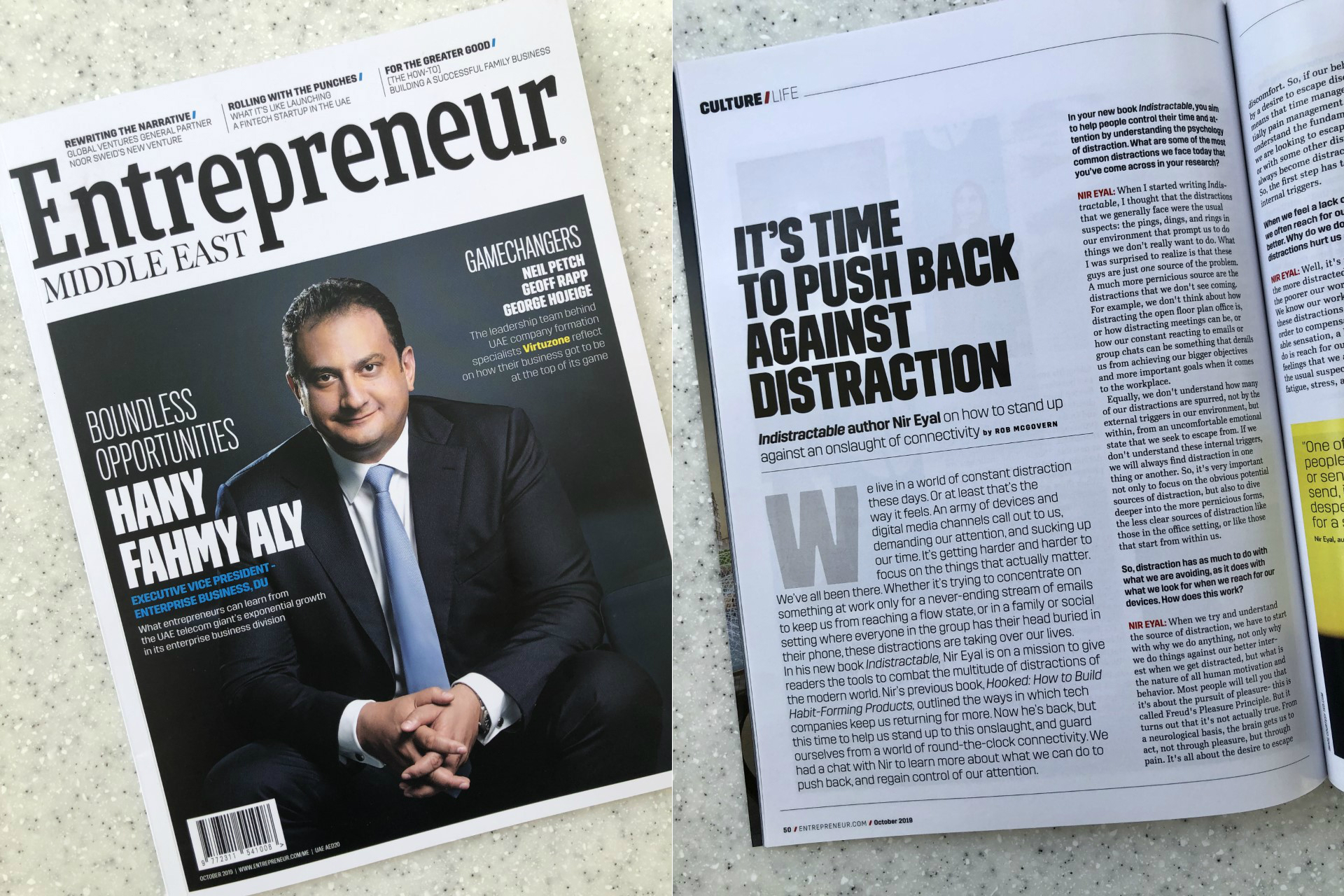I interviewed ‘Indistractable’ author Nir Eyal for the October 2019 issue of Entrepreneur Middle East magazine
We live in a world of constant distraction these days. Or at least that’s the way it feels. An army of devices and digital media channels call out to us, demanding our attention and sucking up our time. It’s getting harder and harder to focus on the things that actually matter. We’ve all been there. Whether it’s trying to concentrate on something at work only for a never-ending stream of emails to keep us from reaching a flow state, or in a family or social setting where everyone in the group has their head buried in their phone, these distractions are taking over our lives.
In his new book ‘Indistractable’, Nir Eyal is on a mission to give readers the tools to combat the multitude of distractions of the modern world. Nir’s previous book ‘Hooked: How to Build Habit-Forming Products’ outlined the ways in which tech companies keep us returning for more. Now he’s back, but this time to help us stand up to this onslaught and guard ourselves from a world of round-the-clock connectivity. We had a chat with Nir to learn more about what we can do to push back and regain control of our attention.
In your new book Indistractable you aim to help people control their time and attention by understanding the psychology of distraction. What are some of the most common distractions we face today that you’ve come across in your research?
When I started writing Indistractable I thought that the distractions that we generally face were the usual suspects; the pings, dings, and rings in our environment that prompt us to do things we don’t really want to do. What I was surprised to realize is that these guys are just one source of the problem. A much more pernicious source are the distractions that we don’t see coming. For example, we don’t think about how distracting the open floor plan office is, or how distracting meetings can be, or how our constant reacting to emails or group chats can be something that derails us from achieving our bigger objectives and more important goals when it comes to the workplace.
Equally, we don’t understand how many of our distractions are spurred, not by the external triggers in our environment, but within, from an uncomfortable emotional state that we seek to escape from. If we don’t understand these internal triggers, we will always find distraction in one thing or another. So it’s very important not only to focus on the obvious potential sources of distraction, but also to dive deeper into the more pernicious forms, the less clear sources of distraction like those in the office setting, or like those that start from within us.
So distraction has as much to do with what we are avoiding as it does with what we look for when we reach for our devices. How does this work?
When we try and understand the source of distraction we have to start with why we do anything, not only why we do things against our better interest when we get distracted, but what is the nature of all human motivation and behavior. Most people will tell you that it’s about the pursuit of pleasure – this is called Freud’s Pleasure Principle. But it turns out that it’s not actually true. From a neurological basis, the brain gets us to act, not through pleasure, but through pain. It’s all about the desire to escape discomfort. So if our behavior is spurred by a desire to escape discomfort, this means that time management is essentially pain management. And if we don’t understand the fundamental reasons why we are looking to escape into our devices, or with some other distraction, we will always become distracted by something. So the first step has to be to master our internal triggers.
When we feel a lack of control at work we often reach for our tech tools to feel better. Why do we do this, and how can distractions hurt us at work?
Well it’s pretty clear that the more distracted we are at work, the poorer our work performance is. We know our work suffers because of these distractions and we know that in order to compensate for an uncomfortable sensation a lot of the time what we do is reach for our devices. The kind of feelings that we are looking to escape are the usual suspects: boredom, loneliness, fatigue, stress, anxiety, a lack of control. All of these things spur us to look for a distraction. Apart from checking our devices, one of the main reasons that people call frivolous meetings, or send emails they shouldn’t send, is because they are desperate for a sense of control, for a sense of agency. We’ve seen people who call these frivolous meetings just because they want to hear themselves talk or because they don’t want to do the real work of actually figuring out the problem for themselves.
You mention that distraction is contagious. How can this negatively affect us in a social setting?
That’s true, it’s called ‘social contagion’, and what we find is that when we use our device in a social setting, or in a meeting, it has a similar effect as when a smoker sees another person smoking and says “oh well, now must be a good time to smoke”. We see this in social settings when someone takes out their phone and starts checking Facebook or their email or whatever, it leads other people to do the same. This is particularly harmful when it comes to the work environment, when you see other people in a meeting checking their email you can’t help but think “I’ve got emails too. I better check them as well”. And so that’s why if I’m going to a meeting in the workplace or in a social setting I aim to leave those devices out of that environment because we really can’t be fully present with other people that we care about or other people in the workplace. Our minds aren’t fully there if they’re half on our phones and half with the people around us.
With that in mind, how much does our success and happiness depend on our ability to manage our attention?
I would say that it is a significant factor. Some people will argue that procrastination – delaying a task that you intended to do with a diversion or re-prioritization – has some good aspects. While there’s nothing wrong with re-prioritizing if your circumstances change or something gets in your way, the problem is that when people procrastinate they don’t allow for it in advance. They procrastinate in the moment, and that is essentially skirting your responsibility to yourself. We know what happens when we lie to other people – it feels bad. You carry around that guilt all day and it’s horrible. Well it turns out that when we lie to ourselves the same thing occurs. We spend time rationalizing why we didn’t do something. We beat ourselves up and say “oh, I’m lazy. I’m this. I’m that”, and none of that feels good. None of that is helpful. There’s a really pernicious effect to this habit that we get into around procrastinating. When circumstances change we can re-prioritize, but we don’t want to do that in the moment. If you commit to doing a task, stick by what you say you’re going to do. It feels so great when you get to the end of your day and are able to say “I did what I planned to do”. I recommend that people reassess their calendar at least once a week to make sure that the week ahead is still consistent with their values and goals. But we don’t want to change our plans in the moment. It has a really negative effect on our sense of well-being and our happiness.
To what extent can understanding the psychology of distraction help us guard ourselves against it?
Initially I didn’t understand why I kept doing the same bad things that were not consistent with my values and goals and not getting the things done that I did want to do. It wasn’t until I understood the deeper psychology of distraction that I could do something about it. There’s a famous quote that’s attributed to Einstein, “Insanity is doing the same thing over and over again but expecting different results”. And that’s what most of us do. Day in and day out we keep getting distracted by the same things. We have that huge To Do list, half of which gets rolled over from one day to the next, and we don’t get the things done that we say we’re going to get done. That’s insanity and we’ve got to stop. And so the idea here is that when you understand the deeper psychology of distraction, when you understand what actually drives us to do the things we don’t want to do that are against our better interests we can do something about it. And that’s what being Indistractable is all about.
Many entrepreneurs and small business owners struggle with the idea of disconnecting and feel that breaking with an ‘always on’ approach might negatively affect their business. What do you say to them?
So this is exactly what Leslie Perlo, a researcher at Harvard Business School, found when she went to do a case study with the Boston Consulting Group and she heard this feedback from a culture that had very high employee turnover. People were dropping left and right, and the excuse was that while we’re in the Client Services business we need to always be available. And it turned out that it was just an excuse. People think to themselves, “How can I get some focused work time in my day?”, and it’s actually not that hard to figure out if you want to. There are solutions you can use like the Do Not Disturb function that comes with every smartphone where if somebody really needs to contact you they can text you with the word “Urgent” and it will get through to you, and that’s just one of dozens of ideas I mention in the book. But fundamentally, we need to ask ourselves if it’s really true that we need to be always-on all of the time. For most jobs out there you need some focused work time, not just constantly reacting to emails and meetings. We can’t do our best work unless we have time to reflect, to strategize, to think. And so it behooves you and your business to make time for reflection in your day.


